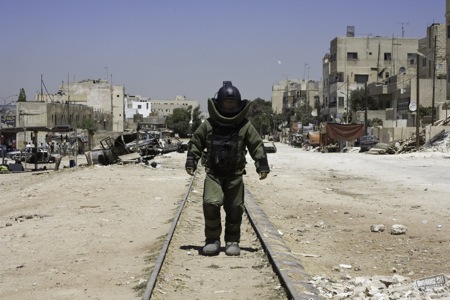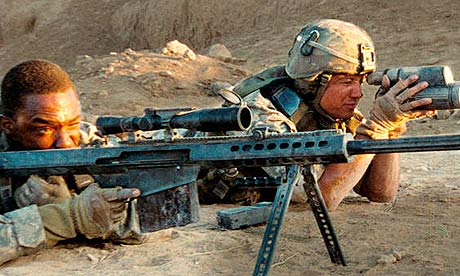
It is rare in American war films that we are presented with characters that are as alarmingly single-minded and undiscriminating as those in Kathryn Bigelow's The Hurt Locker, a taut, stringent panorama of the Iraq war as well as a first-hand account of the suffocating tension of an omnipresent life-or-death mindset. Usually, soldiers are much more than what is presented onscreen, with dense backstories fashioned by the filmmakers to account for their actions, or perhaps they have a bubbling, unspoken rift against their own side. Instead, Bigelow's film is - with the exception of a few didactic scenes - uninterested in dressing its characters up in psychological complexity, favoring a tactile view laden with complacent martyrs willing to uncritically accept the agenda that has been laid out for them. It's not so much a conventional war film providing details about the political conflict at hand as it is an almost documentary-like observation of the experience of battle. For this, it's safe to say that it is anti-Hollywood, hardly giving its audience any extraneous details to clumsily promote an emotional engagement.
Sergeant William James (Jeremy Renner), the film's vacuous central character, is hard proof of this fact. Taking up the role of lead bomb defuser as part of the bomb squad Bravo Company in the place of Sgt. Matt Thompson (Guy Pearce), who meets a tragic end in the first scene of the film, James is a hard-nosed warrior with a complete lack of fear in the face of danger. He is at first off-putting to his two subordinates, Sgt. J.T Sanborn (Anthony Mackie) and Owen Eldridge (Brian Geraghty), because of his callous nature and his refusal to follow the survivalist protocols such as keeping headsets and bomb suits on during missions. Though the trio never forms much of a kinship, they begin to grow accustomed to James' unorthodox professionalism simply by enduring it over and over and making it out of situations unharmed, just as we begin to gradually settle in to Renner's character.
However, Bigelow never lets us be fully comfortable with James. She doesn't attempt to enlighten us about his enigma, preferring to keep his overwhelming motivation towards combat unexplained. He is clearly not simply a blood-lusting savage or a macho show-off; he seems to defuse bombs with a perverse enthusiasm as if it's the only thing in life that he knows how to do with expert precision. We know due to a humorous anecdotal claim (and, more irritatingly, an obvious manifestation of that spoken claim late in the film) that he has no way with family, because he is apathetic about his ambiguously defined significant other and unsure about the merits of having a child, while Sanborn professes to desire this path of life. Yet at the same time he is not a misanthrope, for Bigelow injects him with the occasional humane quality, such as his repeated encounters with a young Iraqi selling DVD's at the Army station, counteracted by his subsequent anger and sadness when he finds the boy's bloody body as a carcass stuffed with terrorist explosives.

Whereas James may be endlessly mysterious for the elusive contradictions that continue to unravel at his core, the other soldiers are fascinating for an opposite reason. Their devotion to formal workmanship and alliance is so steadfast as to be unfounded. What are they fighting for? Why do they display such loyalty to James when he makes little noticeable attempt to reciprocate by following rules? Why do they so reflexively denounce the Iraqi enemies as "bastards" and "assholes" and fire at them with no refrain? Sanborn and Eldridge do not ask themselves these questions, which would inevitably take the film into more actively political territory, contrasting with Bigelow's desire to keep ideological slants out of the picture. However, no matter how much Bigelow intends to be stridently apolitical, the fact that she fixates on American soldiers in Iraq without detailing their past lives or their understanding of the war they're fighting for paradoxically becomes deliciously open-ended, and some sort of political reading is unavoidable. The Hurt Locker leaves us only with these determined soldiers and their actions in combat and inadvertently asks us to try to decide what makes them so determined.
In keeping with the film's relatively contemplative tone, Bigelow eschews an over-arching plot and instead concocts a tight string of sequences documenting the bomb squad's dangerous missions. The suspense is extremely potent as James plods over towards the hidden bombs and Sanborn and Eldridge sit back with their guns perpetually ready to fire, on the lookout for any sign of terrorist spies intending to lure the Americans into a trap. The kinetic camerawork, though at times too heavy-handed in its attempt to scream realism, nonetheless effectively captures the anxiety present in these hazardous circumstances, and the muted, ugly palette, adding a palpable presence of heat and dust on top of the collective rattle of war equipment, augments the stifling quality of Bigelow's set pieces. It's difficult to recall more immersive, grounded combat scenes than the tepidly paced long-distance sniper shoot-out in the desert or the two-minute long paranoia of an innocent man strapped with a slew of explosives (which, to be sure, actually lasts two minutes, as opposed to that unbelievable Hollywood gimmick of exhaustively elongating time during vital moments). Bigelow makes us live the war here unlike any of the other Iraq films in all its hideous immediacy as well as its eerie tedium.
0 comments:
Post a Comment